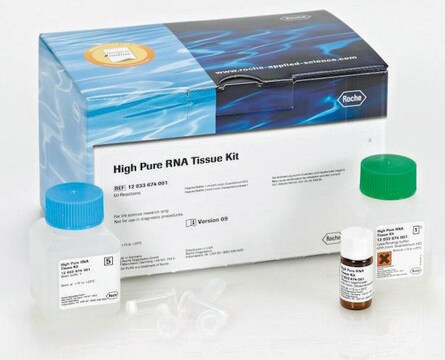11814770001
Roche
DNA Isolation Kit for Cells and Tissues
sufficient for 10 isolation(s)
Synonym(e):
DNA isolation
Anmeldenzur Ansicht organisationsspezifischer und vertraglich vereinbarter Preise
Alle Fotos(3)
About This Item
UNSPSC-Code:
41105500
Empfohlene Produkte
Verwendung
sufficient for 10 isolation(s)
Qualitätsniveau
Hersteller/Markenname
Roche
Verpackung
kit of for 10 isolations
Verwandte Kategorien
Allgemeine Beschreibung
The DNA Isolation Kit for Cells and Tissues provides medium- and large-scale preparation of purified genomic DNA ranging in size from 50 to 150 kb. Remove contaminating RNA and proteins from a wide variety of biological specimens (mammalian tissue, cultured cells, yeast, gram-negative bacteria or mouse tail).
Anwendung
DNA Isolation Kit for Cells and Tissues has been used to isolate DNA from a wide variety of starting materials. The isolated DNA is suitable for many molecular biology applications:
- Genomic Southern blotting
- Sequencing
- Restriction digestion
- PCR/long PCR
- Cloning
Leistungsmerkmale und Vorteile
Obtain increased yields of DNA in less than 2.5 hours.
Benefit from a simple, straightforward procedure (compared with column based methods).
Increase safety and convenience.
Eliminate the use of chaotropic salts, anion-exchange columns, and hazardous organic solvents.
Reduce purification time.
All required reagents are included in the kit.
Benefit from a simple, straightforward procedure (compared with column based methods).
Increase safety and convenience.
Eliminate the use of chaotropic salts, anion-exchange columns, and hazardous organic solvents.
Reduce purification time.
All required reagents are included in the kit.
Komponenten
- Cellular Lysis Buffer
- Proteinase K Solution
- RNase Solution
- Protein Precipitation Solution
Qualität
Each lot of the DNA Isolation Kit for Cells and Tissues is tested for the absence of DNase contamination. Function tests to purify DNA from bovine liver, followed by specific amplification with the Expand High Fidelity PCR System were performed.
Angaben zur Herstellung
Sample material is homogenized in Cellular Lysis Buffer in the presence of a strong anionic detergent and proteinase K. RNA is eliminated by RNase treatment and proteins are removed by selective precipitation and centrifugation. The purified DNA is finally recovered from solution by isopropanol precipitation.
Sonstige Hinweise
Figure 1: Amplification of both short and long DNA fragments from genomic DNA prepared with the DNA Isolation Kit for Cells and Tissues. Genomic DNA was isolated from a variety of sources and then amplified with either Taq DNA Polymerase, the Expand High Fidelity PCR System, or the Expand Long Template PCR System.
Lanes 2, 3: Human DMD fragment (268 bp) and mouse c-myc fragment (580 bp), amplified with Taq DNA Polymerase
Lanes 4, 5, 7, 8: Human c-myc fragment (1.2 kb), mouse β2-microglobulin fragment (3.6 kb), bovine lysozyme gene fragment (6.9 kb), and human tPA gene fragment (9.3 kb), all amplified with the Expand High Fidelity PCR System
Lanes 6, 9, 10: Mouse α-2 collagen gene fragments (5.6 kb and 10.4 kb) and human β-globin fragment (23 kb), amplified with the Expand Long Template PCR System
Lanes 1, 11 : DNA Molecular Weight Markers VI and II
Lanes 2, 3: Human DMD fragment (268 bp) and mouse c-myc fragment (580 bp), amplified with Taq DNA Polymerase
Lanes 4, 5, 7, 8: Human c-myc fragment (1.2 kb), mouse β2-microglobulin fragment (3.6 kb), bovine lysozyme gene fragment (6.9 kb), and human tPA gene fragment (9.3 kb), all amplified with the Expand High Fidelity PCR System
Lanes 6, 9, 10: Mouse α-2 collagen gene fragments (5.6 kb and 10.4 kb) and human β-globin fragment (23 kb), amplified with the Expand Long Template PCR System
Lanes 1, 11 : DNA Molecular Weight Markers VI and II
Purity of isolated DNA: Average A 260 / A 280 ratio: 1.7 - 1.9
Isolation of High Molecular Weight DNA
The kit simplifies the isolation of 50 to 150 kb genomic DNA.
Isolation of High Molecular Weight DNA
The kit simplifies the isolation of 50 to 150 kb genomic DNA.
For life science research only. Not for use in diagnostic procedures.
Lagerklassenschlüssel
12 - Non Combustible Liquids
WGK
WGK 1
Flammpunkt (°F)
does not flash
Flammpunkt (°C)
does not flash
Analysenzertifikate (COA)
Suchen Sie nach Analysenzertifikate (COA), indem Sie die Lot-/Chargennummer des Produkts eingeben. Lot- und Chargennummern sind auf dem Produktetikett hinter den Wörtern ‘Lot’ oder ‘Batch’ (Lot oder Charge) zu finden.
Besitzen Sie dieses Produkt bereits?
In der Dokumentenbibliothek finden Sie die Dokumentation zu den Produkten, die Sie kürzlich erworben haben.
Fatemeh Bitarafan et al.
Molecular genetics & genomic medicine, 8(8), e1274-e1274 (2020-05-21)
Marfan syndrome (MFS) is a multi-systemic autosomal dominant disease of the connective tissue characterized by the early development of thoracic aneurysms/dissections, along with various manifestations of the ocular and skeletal systems. Due to the genetic and clinical heterogeneity, the clinical
Mehrnoosh Khodaeian et al.
Molecular syndromology, 12(2), 118-126 (2021-05-21)
Kabuki syndrome (KS) is a rare genetic disorder characterized by the following 5 crucial symptoms: dysmorphic facial features, growth retardation, skeletal abnormalities, intellectual disability, and dermatoglyphic malformations. Studies show that most of the KS cases are caused by mutations or
Milad Eidi et al.
BMC neurology, 19(1), 153-153 (2019-07-08)
Multiple Mitochondrial Dysfunctions Syndrome 4 (MMDS4) is manifested as a result of ISCA2 mutations. ISCA2 is a vital component of 4Fe-4S clusters assembly machine. Therefore, in MMDS4 patients, deficient mitochondrial respiratory chain complexes I and II, Aconitase and Succinate dehydrogenase
Jocelyn H Wright et al.
Nucleic acids research, 39(11), e73-e73 (2011-04-05)
Herein, a detailed protocol for a random mutation capture (RMC) assay to measure nuclear point mutation frequency in mouse tissue is described. This protocol is a simplified version of the original method developed for human tissue that is easier to
Behsan Hemmatinezhad et al.
Annals of clinical microbiology and antimicrobials, 15, 2-2 (2016-01-23)
Despite the high clinical standing of Helicobacter pylori, its exact routes of transmission and origin have not been determined. Based on the contentious hypothesis, foods play an important roles in the transmission of H. pylori to humans. The present study
Unser Team von Wissenschaftlern verfügt über Erfahrung in allen Forschungsbereichen einschließlich Life Science, Materialwissenschaften, chemischer Synthese, Chromatographie, Analytik und vielen mehr..
Setzen Sie sich mit dem technischen Dienst in Verbindung.




